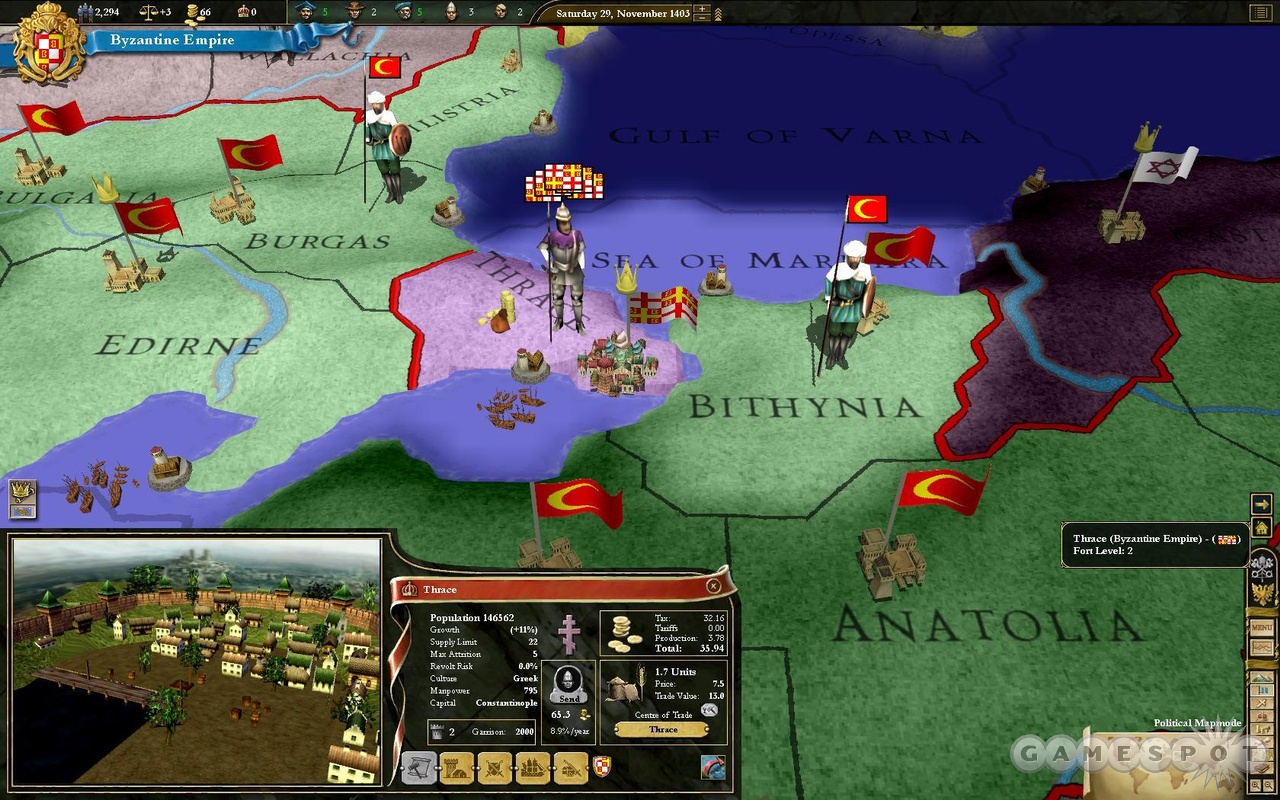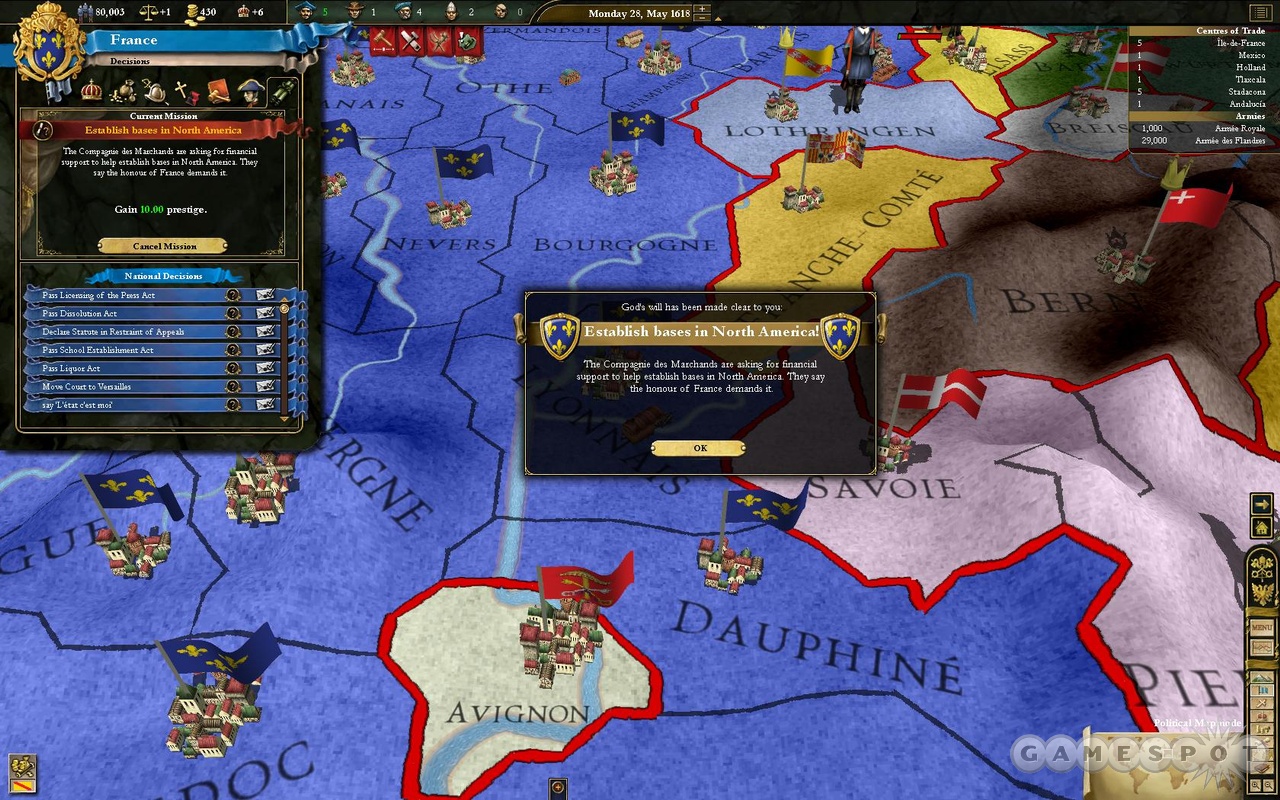Paradox Interactive's outstanding real-time strategy game can already be characterized as falling somewhere between "vast" and "so big you need a doctorate in European history to make heads or tails out of this thing." Despite making the game even bigger, the In Nomine expansion's superb collection of tweaks actually provides more focus to campaigns and makes it easier to hone in on how to best lead a nation from a mere great power to a world-spanning colossus. New features, such as scripted scenario goals and rebel factions, keep you concentrated on the big picture, while fine-tuned elements, such as colonies and the powers of the papacy, allow you to further indulge a love for historical micromanagement.
The basics of gameplay haven't been altered much; historical grand strategy is still the prime mover here. All of the real-time action centers on taking control of a nation at some point between the late medieval era and the dawn of the industrial age in the early 19th century. Games remain wildly detailed and complex. You manage every aspect of statecraft from the provincial level on up; economy, military, trade, religion, foreign relations, and even philosophical notions are at your command. The Europa Universalis series plays like the most complicated board games you've ever experienced, valuing serious strategizing over the "war as a shortcut to world domination" cheat emphasized by too many strategy games. Here, you have to look at all of the factors that contribute to building a stable society and micromanage your way to prosperity--not just crank out the hussars and slaughter everyone who looks at you cockeyed.

In Nomine massages principal elements of gameplay with some adjustments, both major and minor. One of the biggest affects the timeline, stretching it out some 50 years so that you can begin campaigns with the coronation of Henry IV in October of 1399. That might not sound like a big deal, but it does allow you to take part in some significant historical events, such as the final decades of the Byzantine Empire, the invasions of Tamerlane, and the close of the Hundred Years' War. Simply being able to try to save the Byzantines from the Turkish onslaught is reason alone to buy this expansion, especially if you consider yourself a Europa Universalis III pro.
But the most significant difference between In Nomine and the original Europa Universalis III is the greater focus on the big picture when it comes to nations. More specific goals are set forth here, providing benchmarks that can be used to tailor make your nation along historical lines. Instead of waiting for the right year to come along and trigger a war or an abdication, you can now take active steps to make these events happen. A new tab has been added to the domestic panel covering "Decisions," which involves taking on national missions. When guiding Byzantium, for example, you're faced with the mission of trying to recover Greece. Each mission and decision is listed along with the specific criteria that must be met in order to make them happen. If you succeed in these tasks, you gain money, prestige, and other bonuses. Failure isn't met by any punishments, although abandoning an accepted mission to try another one involves a loss of prestige. National objectives generally aren't all that easy to meet, but they add a sense of direction to nation building that was previously lacking in the wide-open grand campaign.
Each province also has a similar tab covering more down-to-earth local decisions, generally involving trade or infrastructure. These tasks are usually easier to achieve. In France, during the Thirty Years' War, for instance, provincial decisions in Calais involve setting up an embassy and establishing a court system. But the relative ease of meeting these objectives are counterbalanced by sheer numbers. If you play a larger power, such as France or England, you are typically stuck with a dozen or more provinces, each clamoring for four or five decisions to be met. So you either ignore a pile of them or wade into heavy micromanagement. It's too bad that Paradox didn't address this issue in the design stage and trim back the number of decisions to one or two maximum per province. This would have been much easier to manage and would have had the added effect of emphasizing major issues within each province.

Rebels spice things up, too. Rebellious factions in provinces can now act somewhat like independent nations, with goals aside from simply causing chaos. If you screw up badly, especially during a war, you'll frequently face serious dissent from within. If you fail to deal with the British when leading the American colonies into the War of Independence, for example, you could soon be up against a rebel army in Massachusetts. This can actually cause the breakup of your nation because rebels will occasionally demand to go their own way and take a province with them. You can use these new rebels to your advantage as well, though. Spies can be sent to encourage rebellions in enemy lands--a tactic that can pay off big time in provinces that have been recently conquered with large populations of disloyal citizens and those who don't follow the state religion. One of the pluses here is being able to essentially keep wars going on the sly long after signing a peace agreement. Rebels can also wreak havoc in your colonies now, which seems to regularly set off late-game problems with those pesky Yanks when you're playing England.
Other additions offer further enhancements. The papacy has been beefed up, mainly with excommunication powers and the ability to call for crusades against Catholic nations. It's sort of neat to see the pope in action like this, although excommunications tend to occur out of the blue without much warning, in the absence of a notable rift with the church or a war. One moment, everything's cool between Rome and the king of Hungary, but the next moment, the monarch is no longer welcome in Sunday school. The same goes for crusades, which are often bizarre. Having the pope declare an English crusade against Granada in 1401 just doesn't appear to make a whole lot of sense. Colony management now does make a lot more sense, however.
Colonies are more than just cash cows here because the increased threat of piracy means that you have to build serious navies to keep these overseas settlements running. Some of the pirate threat is a little over the top, but at least these scurvy dogs keep you on your toes. And colonial micromanagement has actually been eased because colonists now create their own cities and automatically send revenue home in the form of tariffs. All you have to do is set a maintenance slider and colonies almost take care of themselves. Missionaries are now controlled in the same way. Whenever you want to do any converting in a province, just send a missionary and then control the fervor of his efforts through another maintenance slider. No muss, no fuss.
In Nomine broadens campaign play enough to draw fans back for new attempts at conquering the world. Every change here complements the original game, enhancing playability in far-reaching ways. This is the ideal expansion pack for an already outstanding strategy epic.